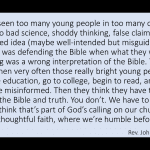The choice of name for this episode of Doctor Who is striking to someone who studies ancient Christianity. Tertullian wrote a famous treatise “Against Praxeas” which was a pseudonym for a bishop. It has been suggested that the actual bishop Tertullian is writing about might be none other than Irenaeus. The nickname means something like “busybody.” And so why did the writers of Doctor Who choose as the title of this episode and the name of the alien pathogen that is the focus of its story, a name that is almost identical to a label placed by a church father on an ancient bishop he judged a heretic? Given the way heresy is sometimes compared to an infectious disease, I’m reluctant to think that the choice is random.
The story comes across as preachy (perhaps connecting it to the church again in a sense), once it is revealed that the pathogen feasts on plastic, and the reason it is able to thrive on Earth is because of the spread of pollution in the ocean and microplastics in organisms including humans.
The story includes an element that is underdeveloped, namely the idea that the pathogen is intelligent and while it destroys infected sentient beings it can apparently also utilize other life forms such as birds to help spread itself.
But it is a story which, if it initially seems confusing and preachy, may seem better, I think, and more profound, upon further reflection. The episode ends with the same words (if my memory serves me correctly), with the Doctor talking about how planet Earth is characterized by lives that are separate and yet connected.
That provides an important clue to making sense of the episode which starts in Madagascar, Hong Kong, the Indian Ocean, outer space, and of course the UK. We are initially in the dark about what is going on, why the familiar crew from the TARDIS are separated in remote locations. But they are, like all of us, separate and yet connected.
There are certainly details that are problematic. But it isn’t the preachiness, at least not more than anything else. The biggest issue with the episode, for me, is why Jake had to ask Adam who it was that was texting him. Did he seriously not have his husband’s number in his phone as a contact?!
Doctor Who can be great in so many ways, and yet drop the ball on what should have been straightforward details.
For longtime fans of the show, the mention of the Autons may remind you of Jon Pertwee, Christopher Eccleston, or both. I’m suprised that I hadn’t pondered very much the fact that the Autons feature in two episodes with new Doctors, in which the show took things in an interesting new direction, and the new Doctors in which deserve more comparison than they’ve thus far received.
As someone active on social media, with a new podcast episode appearing the same day this blog post is, I appreciated the featuring of Gabriella and Jamilla, two travel vloggers who have a vlog called “Two Girls Roaming,” and who are astonished when anyone hasn’t heard of them.
Key dialogue moments include Adam telling Jake “Stop dodging life,” and the Doctor saying she is a romantic and a “sucker for a scientist.”
There is an important point of relevance in that the pathogen was brought to Earth by aliens, looking to use Earth as a lab. The aliens have found their species and probably many worlds devastated by the illness, and Sooki Chang says they traveled across three galaxies looking for a perfect natural lab. But they brought it to Earth, and Earth comes through in coming up with a solution. But this shows that, even if humans not caring for the environment creates situations in which bad things can happen, often malice is what turns that lack of care into a crisis. It is relevant to the topic that is the focus of Orphan 55, i.e. climate change, since humans seem to have played a direct role in starting the bush fires in Australia, as well as being reckless with the planet in ways that lead to fires, once started, being harder if not impossible to bring under control.
There is a nod to the need for humans to take responsibility, to not rely on an extraterrestrial or a supernatural savior to solve the problems for us. As certain humans put it right at the end of the episode, “We’ll take the planet from here.”
What’s your impression of Praxeus (the episode, not the pathogen, although by all means comment on that too if you’re so inclined)?













